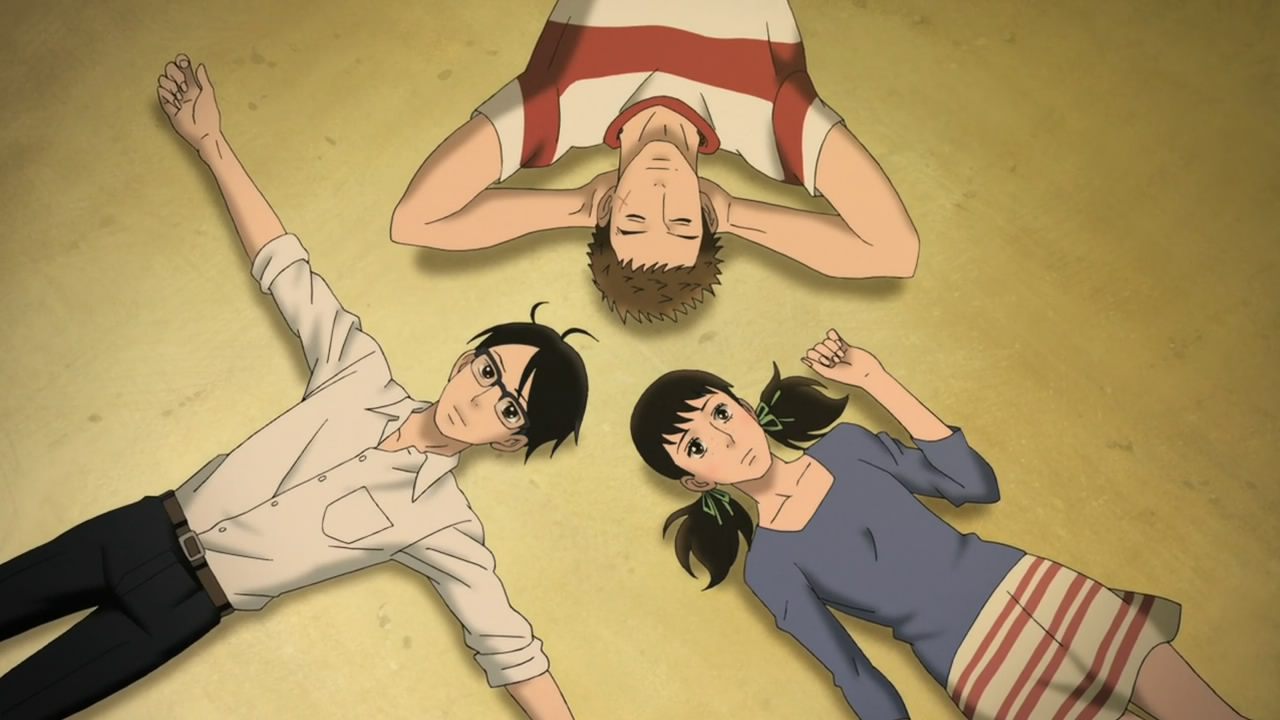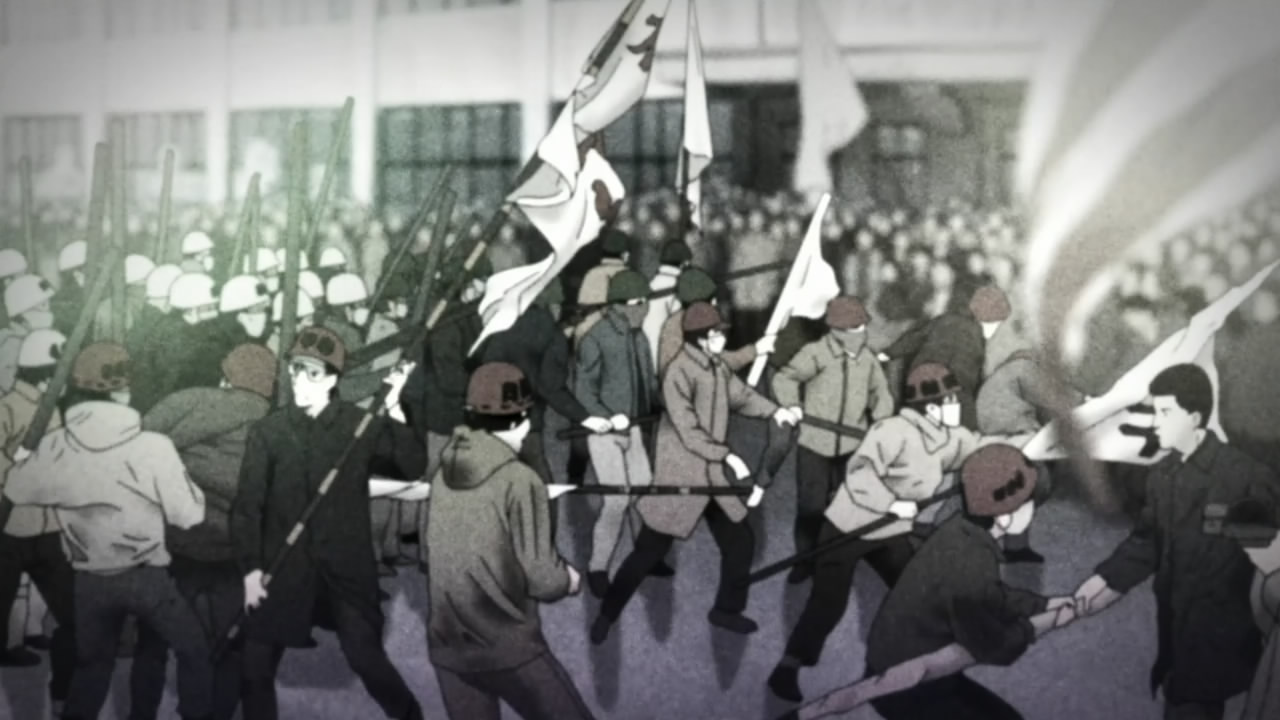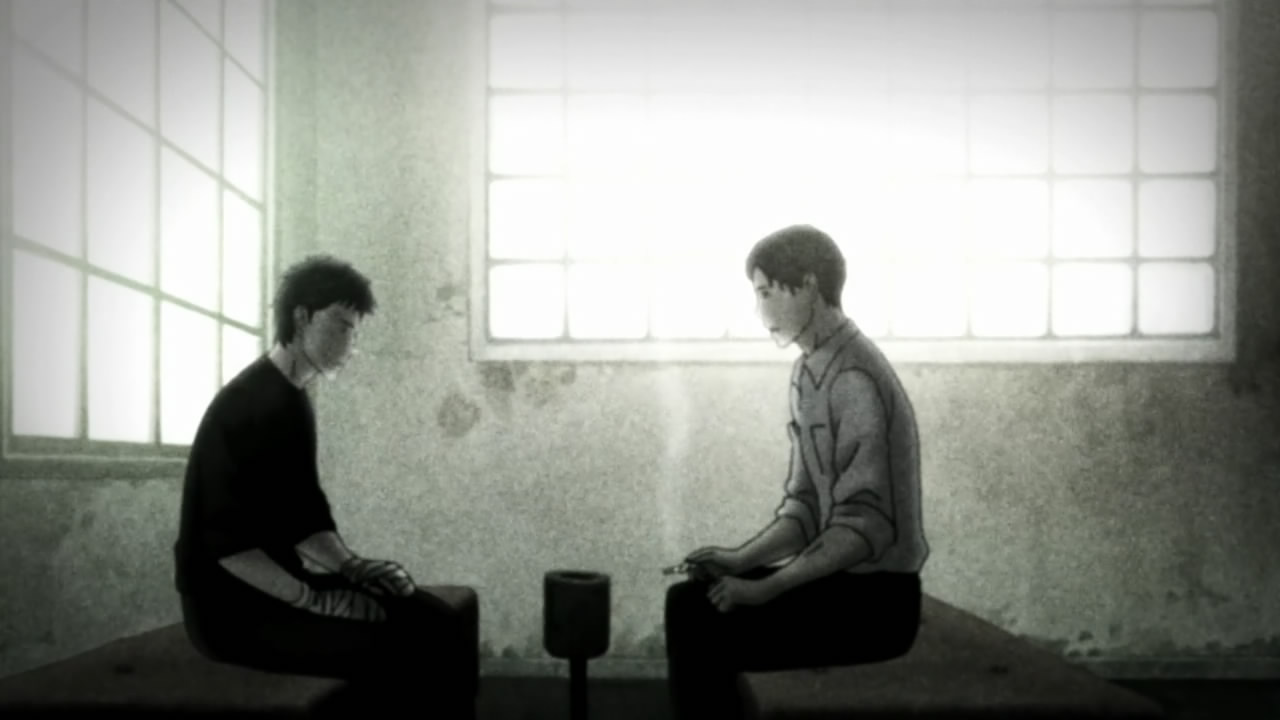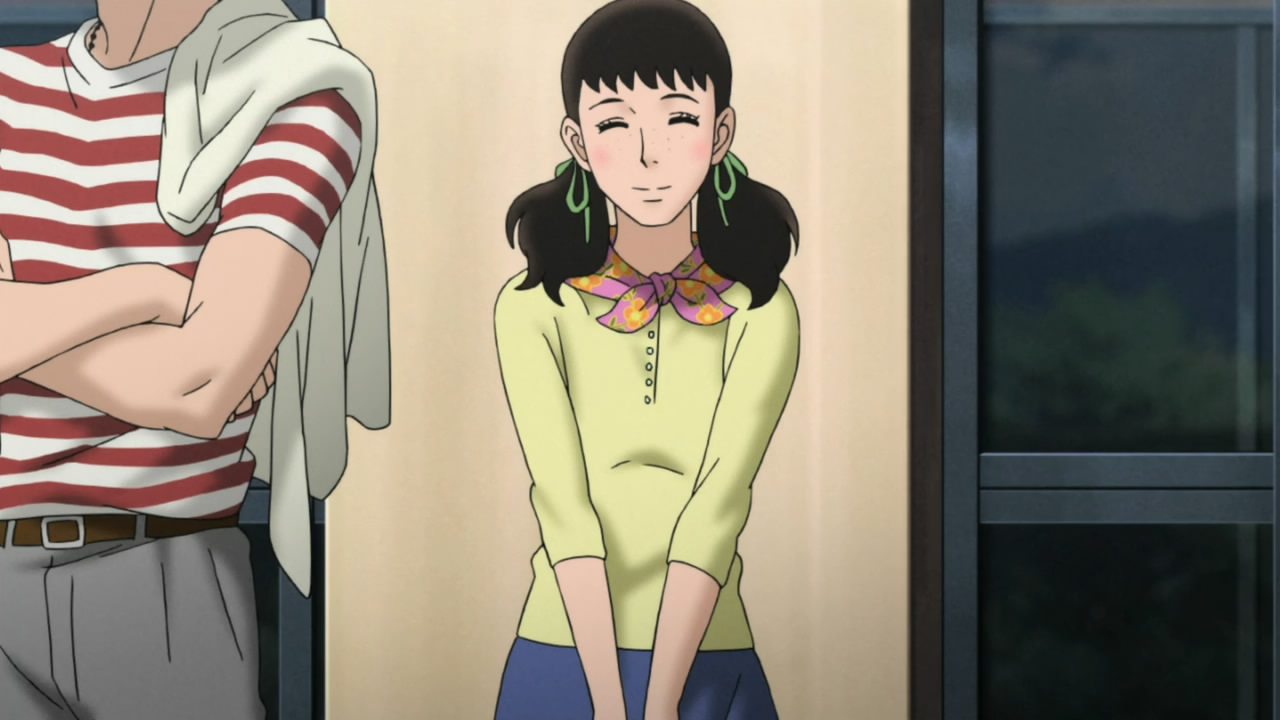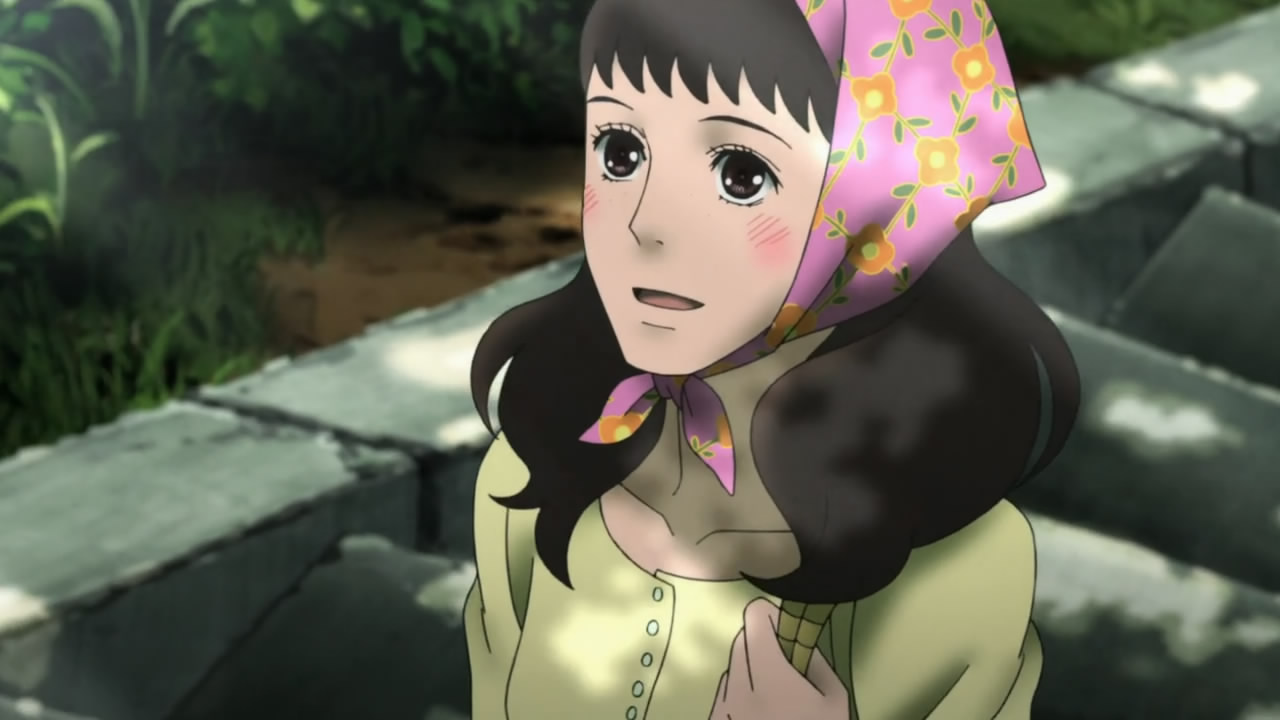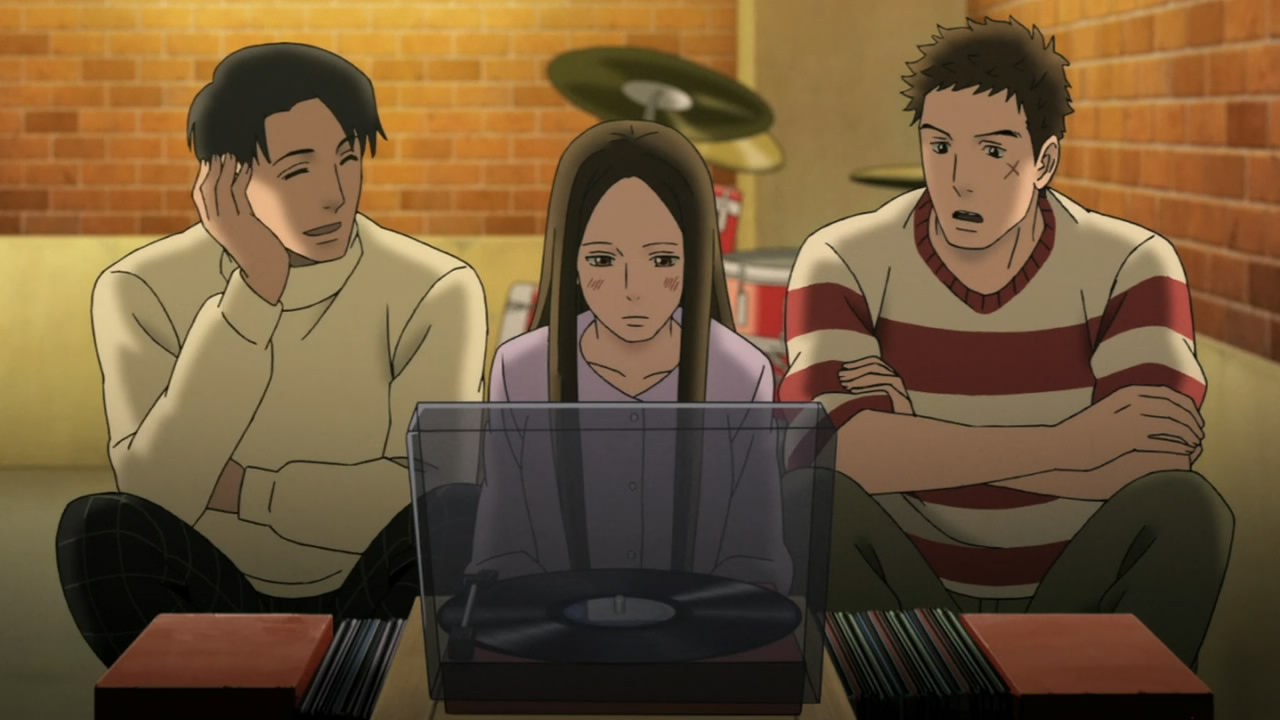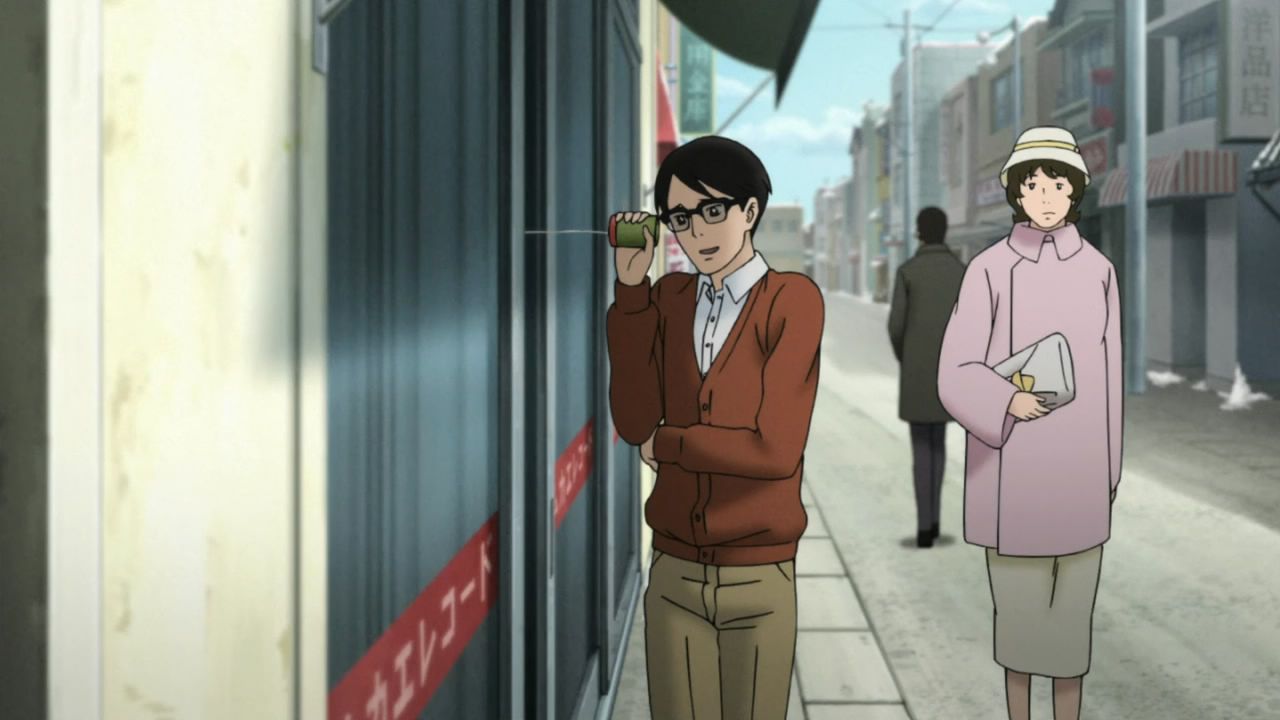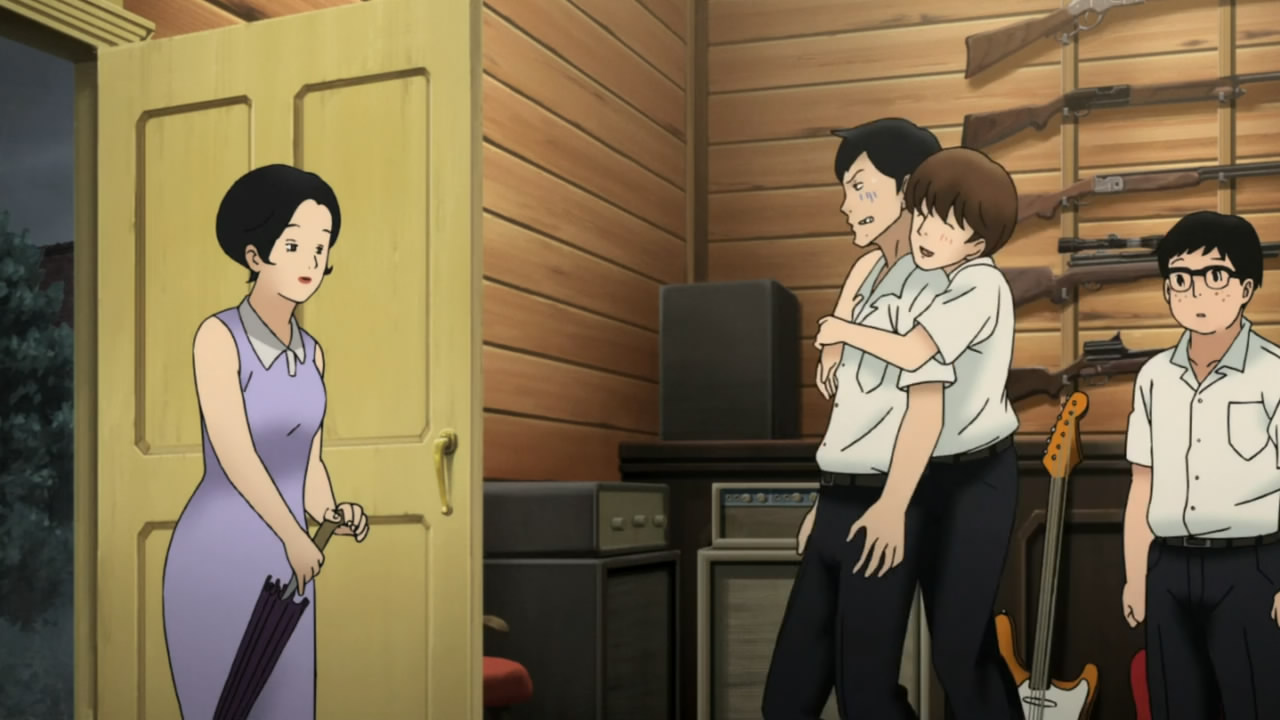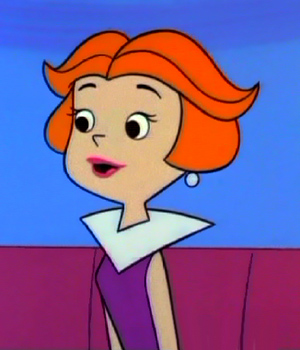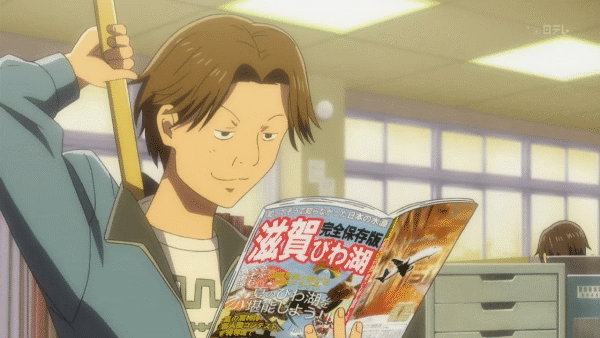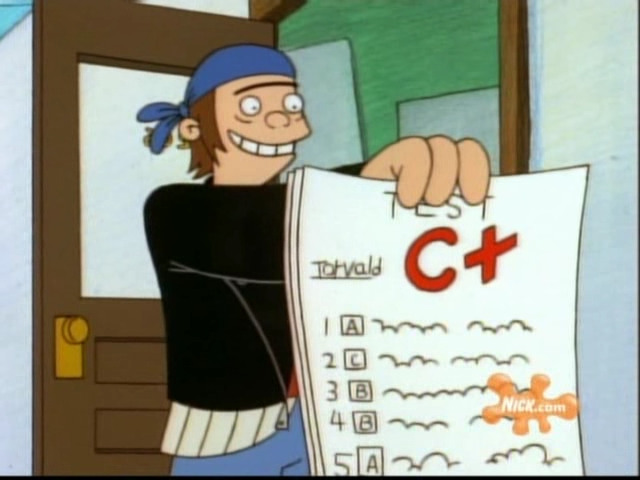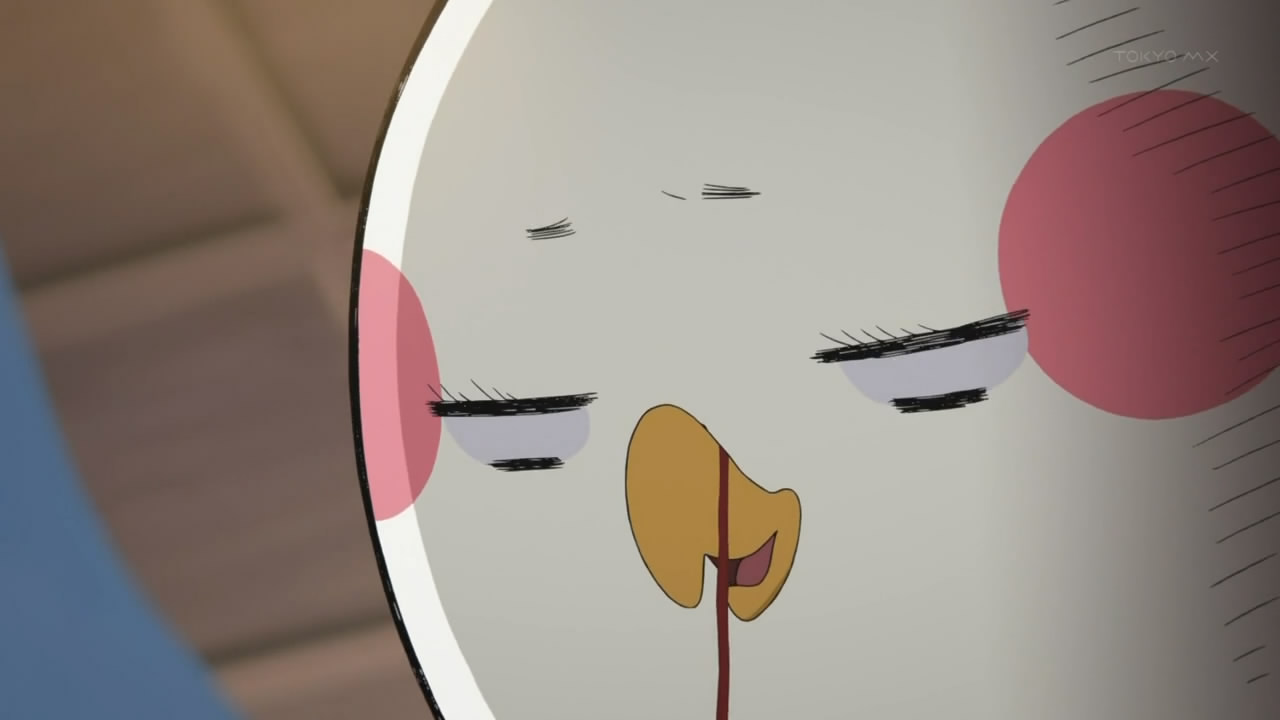
I must conserve my bandwidth until I get FiOS again. Watching only one or two shows this season is a good start. I am a man of simple taste and this bird pleases me. Therefore, Tamako Market is my show this season. Not that that necessarily means I’ll ever mention it again or anything…
Category Archives: Animu
I liked Sakamichi no Apollon
I just marathoned Sakamichi no Apollon today and I’m convinced it was the best show of this last season. Granted, I watched very few shows this season because throughout most of it I was overwhelmed by difficult exams at school and a new OSX86 laptop project I was feverishly working on for a while, but I think I can pretty much dismiss the rest of the shows of the season as inferior without bothering to watch them.
The first episode really got my attention immediately for reasons that show I completely missed the point: I felt tremendous empathy for poor Kaoru climbing that slope every morning to get to school, the reason being that my own school that I attended until last semester is at the top of a hill far steeper than the one in the show. Carrying books up something that steep before a day of expensive, insipid classes that teach you nothing you couldn’t learn for free in less time on the Internet is not something I would wish on my worst enemy. Seriously, if we can put a man on the moon, why can’t we build escalators on sidewalks?
For a so-called josei-muke show the characters have relatively small eyes. Ritsuko, perhaps is an exception, but even she doesn’t have those very large sunfloweresque eyes that I would have expected of a lower tier show of this genre, proving the high quality of this show beyond the need for any further discussion. Nonetheless, I’ll further it.
This is one of those shows for which, after watching the first episode, you say to yourself, “Ah yes, this is why I continue to convince myself, season after season, that there are worthwhile anime out there. It wasn’t self-deception after all”. The theme song alone engaged me immediately, to say nothing of the fun and lively music in the show itself.
I was hoping for a bit more about Jun’s activities in the Zengakuren student strike, but that was not a major plot point it seems. Any time I watch a period show set in the 1960s I hope that the writers will make best use of such an interesting time period, but I feel like it was almost wasted in Sakamichi no Apollon. On the one hand, the fact that the time period is almost irrelevant is appealing to the extent that it’s the sort of story that could happen anywhere, in any era. However, it just seems like a loss to me that one of the major side characters, Jun, unwittingly gets himself involved in a student strike, yet nothing much is made of it except that it ends up being the indirect cause of him moving to Tokyo later on. It’s almost as though it was thrown in there to say to the viewers, “Here’s this apropos reference, just in case you forgot it’s the 1960s”.
The costumes, on the other hand, are really fantastic. There’s something about the cap and red and white striped shirt that Sentarou wears that is very friendly and appealing, rather than threatening. Jun’s plaid pants are the pinnacle of style, if you ask me, though I could never wear them myself due to being vertically challenged. Ritsuko is agonizingly cute with her freckles, pigtails, ribbons, and red winter coat. It’s a shame that the characters are usually wearing school uniforms and that we didn’t get to see more outfits, though the school uniforms themselves are interesting as well since each character wears them in his or her own idiosyncratic style.
Even the unimportant background characters have nice outfits. For example, the mother of Ryunosuke, one of the kids from the rock band that Kaoru and Sentarou upstaged at the culture festival, looks exactly like Jane Jetson and this lady with the pink coat and hat is the type of extra mile effort that, while not strictly necessary, adds flourish to the show. The clothes and music all make me feel nostalgia for the era, which is an incredible feat considering that I hadn’t yet been born at the time.
For a 12-episode series the pacing was quite good. There were times where the show felt a bit heavy-handed like when Yurika and Jun were at the train station and he was about to leave for Tokyo and the scene with Kaoru and Sentarou on the hospital rooftop. While the problem with the former is that it’s simply a really overused cliché, the latter, I personally suspect, wouldn’t have seemed so overstated if it weren’t for the fact that by the time this epiphany moment comes along the viewer has only known the characters for about four hours in total. If it had occurred in episode 22 of a 24-episode series instead of episode 11 of a 12-episode series it may have been quite different for me.
Make no mistake though; my whining shouldn’t be construed as a lack of emotional response. I was tearing up plenty during the last couple of episodes. It’s times like these that I really have to stop and wonder if a show was actually well done and I’ve been legitimately affected by it emotionally or if I’m just a sucker for trite crap and a crybaby in addition. But then I remember that I have impeccable taste and that if I liked something then the only answer to that question is that it must have been good to begin with because retroactivism and coining neologisms are valid as long as I’m the one doing it.
I’m not so hard to please, after all.
I’m really enjoying Chihayafuru, as much as I’m ashamed to admit it again. I’ve seen up to episode 12 now but I’ll be trying to catch up as soon as I can. It’s such a soothing show. Yet, at the same time, though it feels a bit peculiar to say it, there’s a great deal of suspense involved in watching it.
I tried watching Guilty Crown last season and found it unwatchably boring. The directors are telling you that some sort of national crisis is going on, the protagonist is somehow involved, and that you ought to be looking forward to with apprehension the sinister results of this mix. If I felt any suspense watching that show or others like it it was because I felt guilty for not feeling the suspense that the show was obviously telling me I should be overwhelmed with.
With Chihayafuru the suspense doesn’t seem as manufactured as that. It’s a visceral suspense, in the stomach, that says, “I want to know what happens next!”. It comes naturally. Because I barely know the rules of karuta at all I’m learning things as I watch. The games are exciting. It feels like being a spectator at an actual competitive event. The characters’ inner dialogue serves a purpose basically the same as the announcer at a sporting event. I know I’m being manipulated but, unlike most of the time, it doesn’t feel that way. I only realise after the credits roll that I’ve wasted all that emotion on a TV show about make-believe people.
The relationships between characters develop at a steady but quick pace as well. Since the end of the childhood prologue, the passage of time has been handled well without too much wasted time on episodes that focus on just one character for the sake of some fabricated “deep character development” that has little bearing on the overall plot. Each character has some role in more or less each episode without jeopardizing the preeminent position of Chihaya as the protagonist and Taichi as the fuzzy, as-yet-not-fully-realised love interest.
The mythification of Arata as some sort of abstract karuta deity whose support Chihaya has been seeking all these years, despite not much of any response from him, also provides for some suspense and opportunities for speculation on the part of the viewer, who can’t help but wonder if the two will be reunited and, if so, what form the reconciliation will take. Will he be hostile, like he was when she saw him in Fukui? Or will he be apologetic? Could it be that he will join the team? I’m looking forward to finding out.
Oh good, Chiaki Omigawa is in a show this season
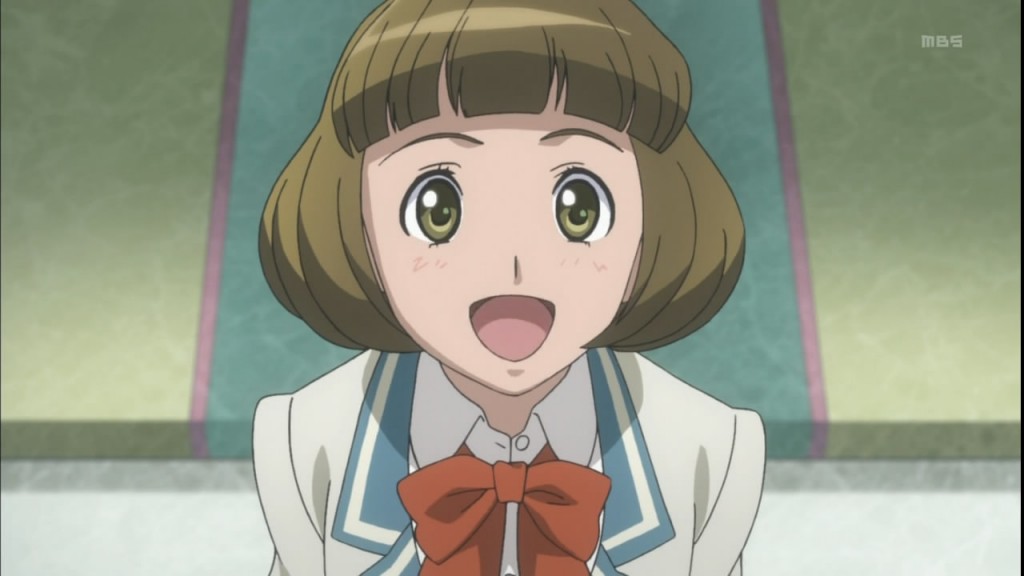
Skies of Arcadia ranks as one of my favourite games for Dreamcast. I will watch anything with airships and pirates.
That means I will be watching Mouretsu Space Pirates. This is a good way to force me to watch the show, since it’s not as though I enjoy piracy or miniskirts for their own sake or anything like that.
Mawaru Penguin Drum and iM@S are over
I hate how expensive R2J DVDs are
![SEDIE06_Hi10P.mkv_snapshot_15.00_[2011.12.20_18.51.03]](https://smilecitrus.info/wp-content/uploads/SEDIE06_Hi10P.mkv_snapshot_15.00_2011.12.20_18.51.03.jpg)
I like Shoukoushi Cedie very much, which was surprising to me since I usually don't go for family-oriented shows unless a cute orphan girl is the protagonist, which, as it turns out, is the case often enough that I actually end up watching such shows frequently. Cedie proves though that it's not just traps and ludicrously optimistic orphan girls bereft of their parents by whom I can be moesaserareta.
Because I’m not an encoder I rarely need full DVDs. The only time I do is when good raws are not available. Sometimes I get DVDs that I never watch. Sometimes I’ll get the first disc in a multi-disc series, intending to decide if it’s worth it to get the rest only after watching the beginning. The trouble is that these DVDs sometimes sit around for months or even more than a year before I watch them, by which time the rest of the discs are often unavailable. Sometimes the rest of the discs are never available in the first place, such as with はいからさんが通る and キャンディ・キャンディ, neither of which ever had official Japanese DVD releases as far as I know.
I’ve got the first four discs of Shoukoushi Cedie. A nice bonus about the DVDs are that it’s one of the few series to have Japanese subtitles, which, other than subtitles in your native language, are about the most helpful thing in the world when, like me, you don’t speak the language in which the dialogue is spoken. All DVDs and Blu-ray discs should have subtitles in my opinion. I usually turn the subtitles on when I watch movies or TV shows in English, too. I just prefer being able to confirm what I think I’m hearing by reading it simultaneously. Either that or my English is even worse than I realise it is.
The problem is that I just can’t get the rest of the DVDs. I have similar problems with other shows that I’d like to watch, too. I want to watch 巴里のイザベル but I can’t find any DVDs. I can find it on Amazon, but the only two sellers who ship internationally on there, one with a new copy and one with a used copy, are charging JPY 30000 and 50000, respectively. The series is only 13 episodes. It should be about JPY 2000. Sometimes I see 13 episode series of relatively unpopular shows like this for JPY 500 on Yahoo! Auctions.
I wanted to watch さすらいの少女ネル very badly at one time. I looked at Amazon and saw that the only seller who ships internationally was selling a used copy of the DVD box for JPY 60000. That’s nearly USD 800. This is almost as ridiculous as the price for the Card Captor Sakura special Blu ray box set that came out recently. Yahoo! Auctions is a bit better, but I’ve only seen copies of the show on there a couple of times for JPY 10000 to 20000 and none of the sellers would ship internationally. With a proxy service I’d still be looking at USD 300+ for a lousy DVD of a feel good kids story based on a book I could buy for USD 2. Thankfully ARR released rips. I love ARR.
I was looking for at least two years for a copy of the 野ばらのジュリー DVDs. There’s only four of them. It’s a short series. Someone finally made them available, by the way, but this was another series I had considered buying because it was so rare in digital form. If I had, I’d be out JPY 49000.
These aren’t even World Masterpiece Theatre shows. Those are more expensive. They don’t release DVD boxes that contain the entire series for those shows; they release a “complete version” which condenses the entire series into only a few episodes. These are actually relatively inexpensive, but why would I want them?
One show that I’ve mentioned I really like before is 風の中の少女 金髪のジェニー which is loosely based on Stephen Collins Foster’s childhood and did not, I repeat not, make me drag my morose, inconsolable Sunggie-clad self out of my desk chair, and drape myself in a comforter as I groped about in the dimly lit room for my weeping companion teddy bear Sniffles because he knows the telephone number for the Tennessee Valley Authority. That most certainly did not happen.
I did cry when I saw the price the same Marketplace seller at Amazon who had the above items for sale was charging for the Jeanie DVD boxes: JPY 64000 and 59000 for volumes one and two. That’s 1579 dollars! Of course, nobody will purchase these items. It would be much cheaper to buy from sellers who do not ship internationally and use a shipping proxy in a case like this, but even if I did, I could expect to pay more than 200 dollars. Maybe that’s reasonable for some people, but it’s still too high for to make it practical for me.
There are other shows I want, too. They all cost too much money though. Proxy shipping services are impractical for low value items like DVDs, but I must either use such a service or pay hundreds and hundreds of dollars for these DVDs from the few sellers who do ship internationally.
This is one of the ways copyright infringement by duplication via Internet can be rationalized. You may think it’s immoral to duplicate some DVDs without permission and then proceed to enjoy them for free. But then, when you see that it would actually cost around USD 500 for many of these series, some of which are unpopular and short, you may no longer think it so immoral. Shoukoushi Cedie is a Sekai Meisaku Gekijou series and has 10 volumes, each of which are about JPY 3000 for domestic buyers. That’d be JPY 30000 for a domestic buyer. If I used Shopping Mall Japan service I’d pay an additional USD 35 plus various other fees for an order like that, not to mention domestic shipping and international shipping, which is always expensive with Japan Post. On the one hand I understand that international mail needs to be expensive because the transportation, inspection, and other costs are very high for any type of postal system, but I’m used to USPS prices. I can send a book from New York to Guam for USD 3.50 and probably have it arrive in less than a week. 30000 Yen is about 400 dollars, plus 35 dollars, plus a few dollars for domestic shipping, plus about 30 dollars for international shipping, plus a few more dollars for other fees, and you’ve got a pricetag of nearly 500 dollars for used DVDs of a show from the 1980s. When I think of it this way, I can’t really think of duplication of such DVDs as immoral.
I should really be ashamed at what I waste my time watching and why
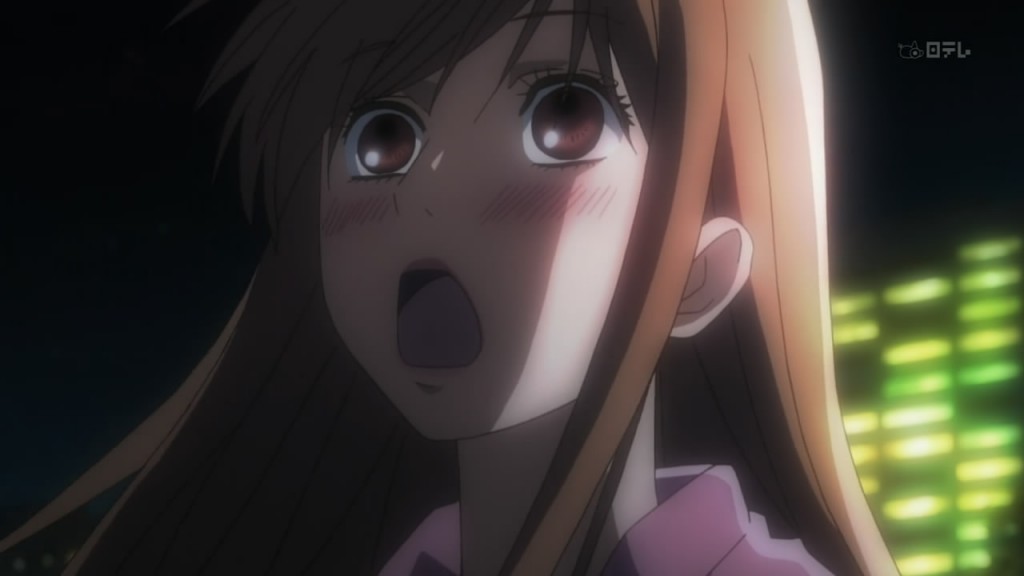
I took this screenshot because I thought it would be useful for the next time I needed a good picture for one of those "I came" images but then I felt guilty using this show for that so I'm going to trail off now...
I’m such a hypocrite. I pretend like I’m some connoisseur of TV but I just watch whichever show has cute character designs, a catchy gimmick, or voice actors with whom I’m enamoured. Chihayafuru is appealing for most of the same reasons that watching Pokemon is and episode 09 really made clear to me why. The viewer is the protagonist, Chihaya, and looks forward to every episode/day in which opportunity is provided for her to overcome one of life’s obstacles, recruit a member for her club, increase her experience points, or get a kansetsu kiss from Miyano Mamoru. Episode 09 was the quintessential training camp episode in which the clubmembers go to the house of one of its members to practise. The protagonist’s variegated array of teammates, from the nerdy Tsukue-kun to the normal girl Kanade to the allstar bishounen Taichi, are all the viewer’s friends and it’s my relationship with them, not some fictional protagonist’s, that are slowly improving and bestowing significance upon my tender developmental years. It’s my aching otomegokoro, not hers. This isn’t healthy but it’s why we watch TV. It’s just more apparent in josei and kids shows than elsewhere that this is our motivation for watching. I nearly let myself watch Nana as a result of a similar need for vicarious emotional discharge but mustered up sufficient shame to avoid that pitfall just in the nick of time.
Neither the director nor the writer draw your attention to it quite as blatantly when it comes to gaining experience points in the real world. I did laundry today but I don’t feel like my competence level as a human has increased all that much for it, nor do I feel the sense of satiety or completeness that gets underscored at the resolution phase of each story in shows like Pokemon and Chihayafuru. Problems arise, tension builds across an episode or several but, eventually — and most importantly before the viewer falls into despair from beginning to perceive the show as a “downer” and risk dismissing it on those grounds — the problem gets resolved and we all feel that we’ve overcome one of the hurdles of childhood and we’re one step closer to fulfillment, maturity, and satisfaction. In TV World everything happens for a useful reason; each time we resolve a problem we get noticeably better at life. Our skillset gets filled out, our minds expanded, or our hearts opened to something new. It’s an enjoyable experience because TV concentrates this development into a few short minutes at the end of an episode instead of allowing it to take the more diffuse, less noticeable form it manifests itself in in daily life, a form nowhere near dense enough to function as the emotional payload of a TV episode.
But just like caffeine, prolonged use means I’m needing this in ever larger doses. Real life wasn’t cutting it from the beginning, but now even TV isn’t saccharine enough for me. Chihayafuru and Tamayura Hitotose are but I don’t know what I’m going to do next season. I’ve been watching a lot of Sekai Meisaku Gekijou lately because they exclusively adapt stories that fulfill the above formula. It’s not enough though and on a practical level, I can’t buy from Yahoo! Auctions and not all of the seasons are available on Share. Ghibli is good for honeyed fairy tales, but I’ve used those films up.
Industry, do you hear me? Forget robots, explosions, and sport shows; spin more syrupy accounts of growing pains that I may watch from under a snuggly warm blanket with my wet sleeves and carton of melancholy flavoured ice cream.
I’m happy that exams are over (but I quit anime again)
I quit anime again. Initially this was because I figured I’d be playing Skyrim right now but I’ve been embraced by one of my periodic waves of morality and decided that I will buy it instead. In keeping with that decision, however, I’ll now be waiting a year or so until the price decreases.
If I’m not watching anime or playing Skyrim though I have no real reason to keep writing anything. I never have anything interesting to say anyhow. I’m to media consumers as Takeru Kobayashi is to diners. I’m the least discerning viewer out there.
Calling someone a Type B anime viewer can have a pejorative connotation. I once maintained the delusion that I could claim to be a Type A viewer because I count series and films like Ghost in the Shell, Serial Experiments Lain, NHK ni Youkoso! and Satoshi Kon movies among my all-time favourites. But I can no longer delude myself about being a Type A viewer when I’ve also seen Okusama wa Joshikousei. I’m not a connoisseur, I’m a garbage disposal.
One of my guilty pleasures is watching Hoarders on television. This is a reality TV show in which camera crews and TV therapists exploit people who suffer from chronic disorganization and clutter in their homes. Some of these people are really hopeless nutcases who pose a danger to themselves and their neighbours, but others are just normal people who have too much junk in their homes. Part of the definition of a “hoarder” that the show employs is that, regardless of the type of item that the patient accumulates, it must be relatively worthless. Occasionally they profile people who do collect valuable items. They’re not hoarders; they’re collectors. I see an analogy between the behaviours of these people and my own omnivorous appetite for pandering, derivative, clichéd shows that rely on preexisting, done to death tropes rather than taking a leap and telling an interesting story.
If it weren’t for FTTH and my lack of ethics, I’d be the ideal consumer. I can easily imagine myself buying any Blu-ray with an attractive cover design, any video game with voice actors I like, and anything associated with a studio that produced a single franchise that I may have once enjoyed, regardless of how abhorrent their subsequent work may have been. I have no taste whatsoever. The only reason I can associate somewhat competently with people when they talk about anime masterpieces is because I watch everything. The principle of averages means that it’s inevitable that I eventually watch some gems with the kind of methodology I employ.
Having said that, I’ve stalled on one of the only two shows I’m keeping up with this season: Idolmaster. To my credit, I’m still watching the type A show, Mawaru Penguin Drum. The opening of this most recent episode reminded me of that famous painting which, proving to myself that I’m not a complete buffoon, I knew was by Seurat, though I had to look up the name,


This show is great, but I sometimes find that, rather than strain my head to try and construct some understanding of the overall plot, I just say to myself, “Fuck it. I’ll give the show the benefit of the doubt that it’s profound”. The more abstract an episode is and the harder the narrative thread is to discern, the more likely I am to be impressed yet the less likely I am to understand why.
Figuring out exactly what I am supposed to be most impressed by is too much effort so I sometimes skip the drawn-out post-viewing contemplation session and jump ahead to the part where I just give the show credit for saying something incisive, deconstructing some taken-for-granted assumption about the social world, or challenging my preconceived notions about some social construct, even without knowing which cornerstone of my worldview has just been shattered. It could be all of them for all it matters. Something is certainly being chipped away at. It just remains to be seen exactly what.
As for my vengeance driven experiment, I’ll go ahead and try to resume that next week. I couldn’t very well count how many people were using electronic devices while taking exams. Incidentally, I don’t know whether I should do a facepalm or be impressed at the security-by-obscurity tactic to prevent forgeries used by the City University of New York on their official department stamps:

One more thing: child broiler? What is that? a German fairy tale?

